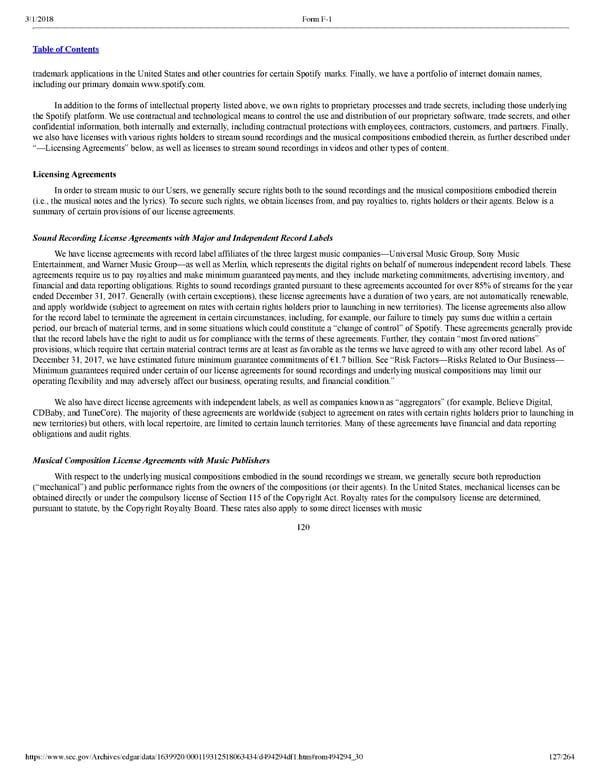127/264 trademark applications in the United States and other countries for certain Spotify marks. Finally, we have a portfolio of internet domain names, including our primary domain www.spotify.com. In addition to the forms of intellectual property listed above, we own rights to proprietary processes and trade secrets, including those underlying the Spotify platform. We use contractual and technological means to control the use and distribution of our proprietary software, trade secrets, and other confidential information, both internally and externally, including contractual protections with employees, contractors, customers, and partners. Finally, we also have licenses with various rights holders to stream sound recordings and the musical compositions embodied therein, as further described under “—Licensing Agreements” below, as well as licenses to stream sound recordings in videos and other types of content. Licensing Agreements In order to stream music to our Users, we generally secure rights both to the sound recordings and the musical compositions embodied therein (i.e., the musical notes and the lyrics). To secure such rights, we obtain licenses from, and pay royalties to, rights holders or their agents. Below is a summary of certain provisions of our license agreements. Sound Recording License Agreements with Major and Independent Record Labels We have license agreements with record label affiliates of the three largest music companies—Universal Music Group, Sony Music Entertainment, and Warner Music Group—as well as Merlin, which represents the digital rights on behalf of numerous independent record labels. These agreements require us to pay royalties and make minimum guaranteed payments, and they include marketing commitments, advertising inventory, and financial and data reporting obligations. Rights to sound recordings granted pursuant to these agreements accounted for over 85% of streams for the year ended December 31, 2017. Generally (with certain exceptions), these license agreements have a duration of two years, are not automatically renewable, and apply worldwide (subject to agreement on rates with certain rights holders prior to launching in new territories). The license agreements also allow for the record label to terminate the agreement in certain circumstances, including, for example, our failure to timely pay sums due within a certain period, our breach of material terms, and in some situations which could constitute a “change of control” of Spotify. These agreements generally provide that the record labels have the right to audit us for compliance with the terms of these agreements. Further, they contain “most favored nations” provisions, which require that certain material contract terms are at least as favorable as the terms we have agreed to with any other record label. As of December 31, 2017, we have estimated future minimum guarantee commitments of €1.7 billion. See “Risk Factors—Risks Related to Our Business— Minimum guarantees required under certain of our license agreements for sound recordings and underlying musical compositions may limit our operating flexibility and may adversely affect our business, operating results, and financial condition.” We also have direct license agreements with independent labels, as well as companies known as “aggregators” (for example, Believe Digital, CDBaby, and TuneCore). The majority of these agreements are worldwide (subject to agreement on rates with certain rights holders prior to launching in new territories) but others, with local repertoire, are limited to certain launch territories. Many of these agreements have financial and data reporting obligations and audit rights. Musical Composition License Agreements with Music Publishers With respect to the underlying musical compositions embodied in the sound recordings we stream, we generally secure both reproduction (“mechanical”) and public performance rights from the owners of the compositions (or their agents). In the United States, mechanical licenses can be obtained directly or under the compulsory license of Section 115 of the Copyright Act. Royalty rates for the compulsory license are determined, pursuant to statute, by the Copyright Royalty Board. These rates also apply to some direct licenses with music 120
 Spotify F1 | Interactive Prospectus Page 126 Page 128
Spotify F1 | Interactive Prospectus Page 126 Page 128